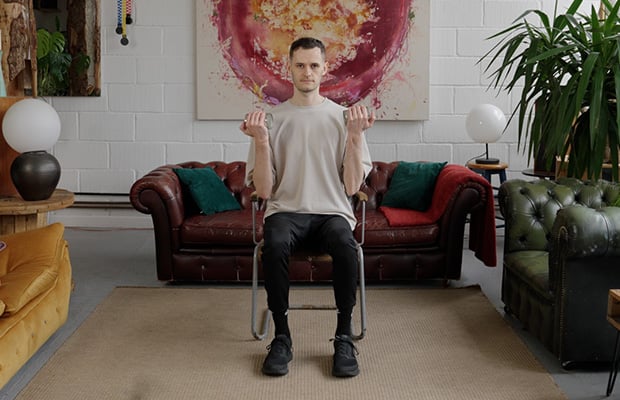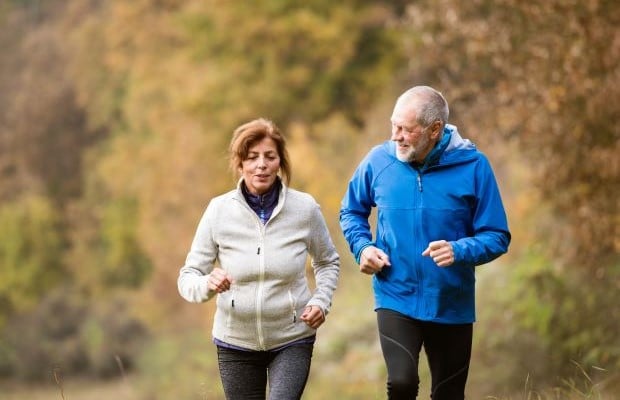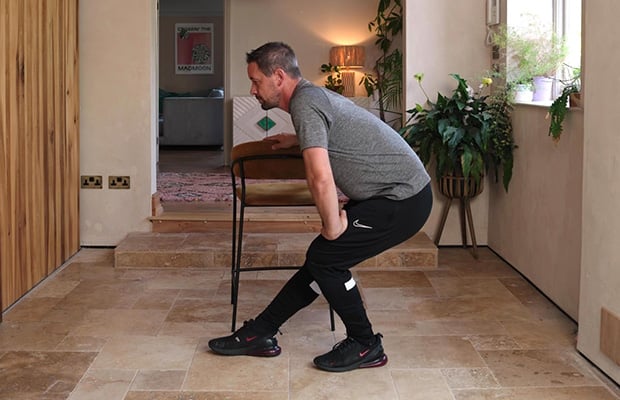
Low intensity aerobic exercises – 10 minute home workout
Looking for a safe and low intensity workout? Cardiac rehab expert Hara Markos shares simple cardio exercises you can do at home, including ball throws, speed ball arms and front kicks.

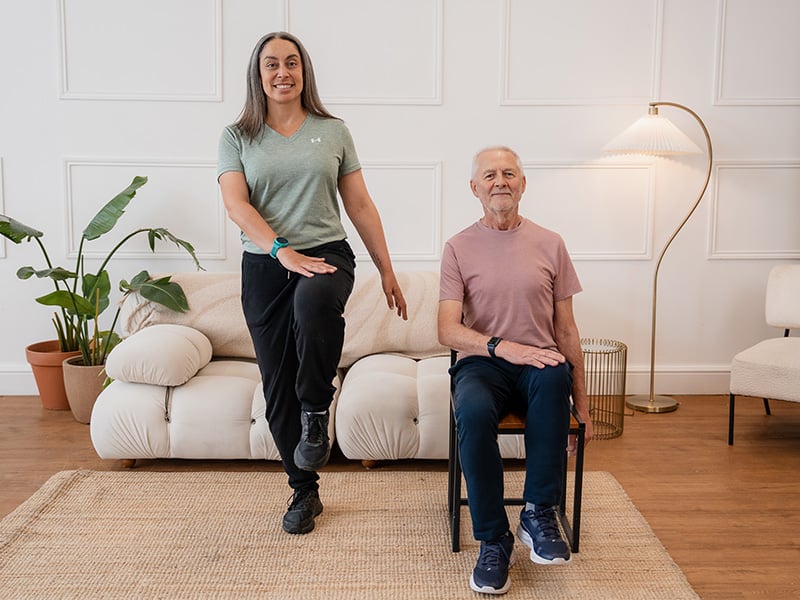



Benefits of low intensity aerobic exercises
Aerobic exercise, also known as cardiovascular or cardio exercise, is any form of movement that increases your heart rate and makes you breathe a bit faster.
It’s an important way to look after your heart and circulatory system, especially if you have a pre-existing heart condition or risk factors for one.
Staying active can help to manage your weight, lower blood pressure, reduce cholesterol and improve your mental wellbeing.
The NHS recommends aiming for at least 150 minutes of moderate intensity exercise a week, such as brisk walking and cycling.
However, moderate and high intensity workouts might not be right for you if you have a health condition, mobility problem, or if you’ve just started exercising.
The good news is you can still enjoy the benefits of exercise at low intensity. These include gentler forms of movement, such as walking, gardening and housework.
The exercises below can be done at low or moderate intensity. However, there are also a couple of high intensity movements you can try too, but only if you do not have a health condition that may increase your risk of injury.
- Learn more about the different types of exercise that are good for your heart.
Finding the right exercise intensity for you
It can be tricky to work out how hard to push yourself when you’re exercising. What feels easy for some people might be challenging for others.
Your cardiac rehab professional may use a rating system called rate of perceived exertion, also known as the BORG Scale, to work out how difficult an exercise feels to you.
The scale goes from 6 to 20. Exercising below 11 is low intensity and between 11 to 14 is moderate intensity. And over 14 is high intensity.
When working at low intensity your breathing should be steady, and you should be able to hold a conversation easily.
When working at moderate intensity, you should feel warmer and slightly breathless but still able to talk.
And when working at high intensity, you should be breathing hard and fast, and only able to say a few words at a time.
If any exercise starts to feel too difficult, try slowing down or making the movements smaller.
And if you feel unwell or notice any chest pain or heart palpitations when you’re exercising, stop immediately and speak to your doctor.
- Learn more about finding your target heart rate when exercising.
Getting started with aerobic exercises
Aim to do the exercises below at least 2 to 3 times a week. Check with your doctor before you start if you have a heart or circulatory condition, high blood pressure or diabetes.
Make sure to do the short warm up before you start, and the cool down afterwards.
Spend about 10 to 20 seconds repeating each exercise 8 to 12 times when you try them for the first time. Then take a short break to catch your breath, before moving onto the next exercise.
As you get fitter and stronger, you can spend more time doing each exercise, and less time resting in between. Try repeating each exercise 4 to 6 more times for an extra 10 seconds.
If you need to, you can change the intensity by trying the different options for each exercise. For example, you might want to do some standing up, and others sitting down.
I’ll be demonstrating each exercise standing up, and Peter McCudden, who has been through cardiac rehabilitation, will show you how to perform them while sitting down.
Over time, you can gradually build up until you’re able to complete 10 minutes of non-stop aerobic exercise.
Warm up exercises
It’s important to do some warm-up exercises when you first start your workout. This helps your body get ready for activity by increasing your heart rate gradually and getting your muscles used to moving.
Aim to reach around 8 to 9 on the RPE scale (very light and easy to talk) by the end of your warm-up.
Marching on the spot
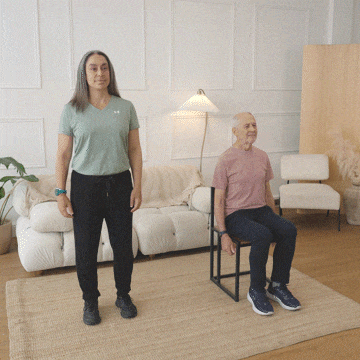
- Sit or stand with your feet hip-width apart.
- Start marching on the spot at a comfortable pace.
- Use your arms to help with the movement.
- March on the spot for around 1 minute.
- March for another 30 seconds, this time while rolling your shoulders backwards.
Side taps
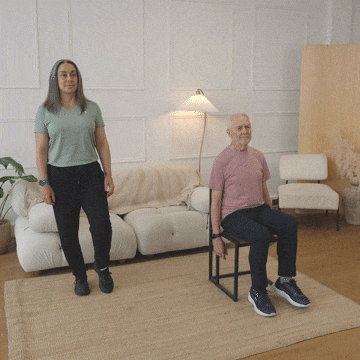
- Sit or stand with your feet hip-width apart.
- Lift your right foot and tap your toes to the right side.
- Return your foot to the starting position, then repeat on the left foot.
- Repeat on both sides 8 to 12 times.
- Next, try raising both arms straight out to the sides at shoulder height as you step out, and lowering them as you step back in.
- Repeat the exercise another 8 to 12 times with the arm movements.
Knee raises with hand tap
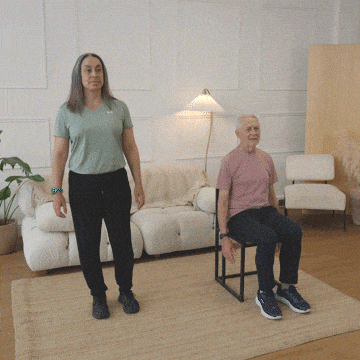
- Sit or stand with your feet hip-width apart.
- Lift 1 leg up as high as you can, keeping your knee bent.
- Lower your leg, then repeat on the other side.
- Repeat the exercise 8 to 12 times.
- Repeat another 8 to 12 times, this time while tapping your raised knee with the hand on the opposite side.
5 low-intensity aerobic exercises
1. V steps
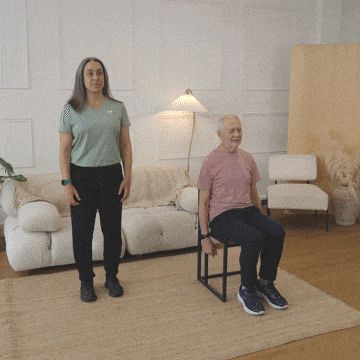
- Sit or stand with your back straight and feet together.
- Step your right foot out diagonally to the right in front of you, and then do the same with your left foot on the other side, so you’re standing in a wide stance.
- Return your right foot back to the starting position, and then your left foot.
- Repeat the exercise 8 to 12 times.
Next step: As you move each leg, lift the arm on the same side out in front diagonally at the same time, and then lower them as you step back.
2. Front kicks
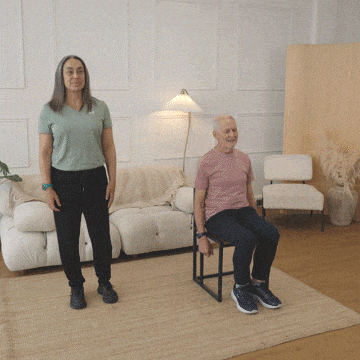
- Sit or stand with your feet hip-width apart and arms by your sides.
- Lift 1 leg up as high as you can, keeping your knee bent.
- Extend your raised leg, keeping your foot flexed and toes pointed upwards.
- Bend your knee again and return your foot to the floor. Do the same on the other side.
- Repeat the exercise 8 to 12 times.
Tip: If you’re finding the exercise challenging, keep your raised leg at a lower height.
3. Touch down, reach up
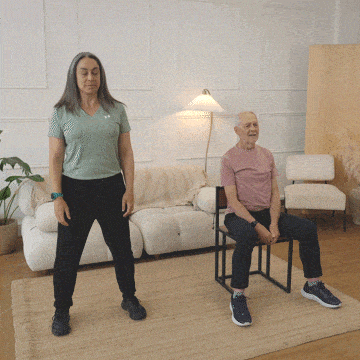
- Sit or stand with your feet slightly wider than hip-width apart and hands by your side.
- Reach your arms down towards the floor as low as you can. If you’re standing, bend your knees into a squat as you lower down. If you’re seated, keep your head above your heart.
- Sit or stand back up and lift your arms up to touch your shoulders.
- Then reach your hands straight up to the sky.
- Bring your arms back down again to tap your shoulders, then reach back down to the floor.
- Repeat the exercise 8 to 12 times.
4. Speed ball arms
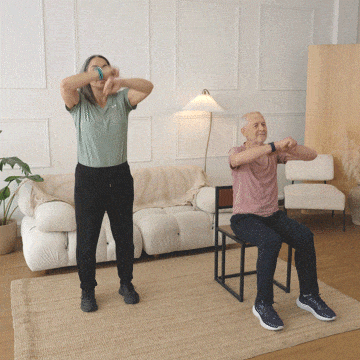
- Sit or stand with your feet hip-width apart.
- Stack both arms on each other bent at the elbows at shoulder height in front of you.
- Rotate both arms around each other as fast as you can, keeping them at shoulder height.
- Keep doing the exercise for 10 to 20 seconds.
- Change the direction you’re rotating your arms and repeat for another 10 to 20 seconds.
Next step: Keep your feet moving by marching on the spot at the same time.
5. Ball throw and catch
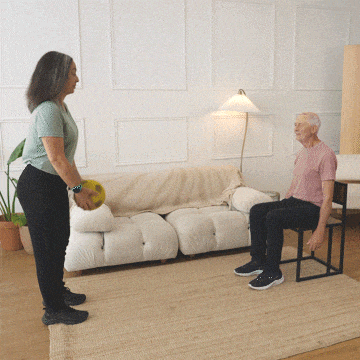
- Sit or stand a short distance opposite either a wall or an exercise partner.
- Throw a ball against the wall in front of you, or to your partner who will then throw it back.
- Try to catch the ball and then throw it back against the wall or to your partner.
- Repeat the exercise 8 to 12 times.
Tip: Softer and larger balls will be easier to catch, while harder and smaller balls will be more difficult.
2 high-intensity aerobic exercises
The following exercises involve higher intensity movements. They also include low intensity alternatives if high intensity exercises are not right for you.
Check with your doctor before you try high intensity exercises if you have a heart or circulatory condition, or you’re concerned these exercises will make an existing medical issue or injury worse.
1. Towel slam
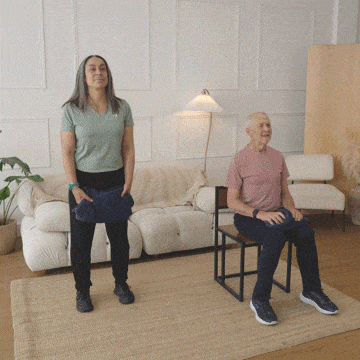
- Sit or stand hip-width apart holding a medium-sized towel in both hands.
- Raise the towel above your head and then throw it forcefully onto the ground just in front of you.
- Pick up the towel from the ground. If you’re standing, bend your knees as you lean down.
- Repeat the exercise 8 to 12 times.
Low intensity alternative
Only lift the towel to shoulder height instead of above your head. If you cannot bend all the way to the ground, place a chair or step in front of you to throw the towel onto instead.
2. Star jumps
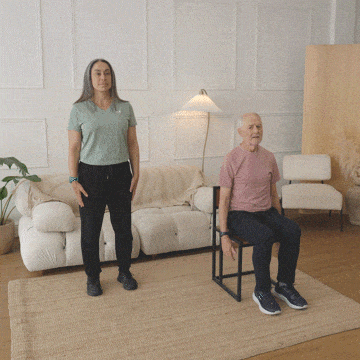
- Stand with your feet together and your arms at your sides.
- Jump both legs out to the sides and lift your arms out to the side. Land softly with your knees bent.
- Jump back to the starting position with your feet together and arms by your sides.
- Repeat the exercise 8 to 12 times.
Low intensity alternative
Step your feet and move your arms out to the side one side at a time, or try the seated option:
- Sit on a solid chair with your back straight, feet together and arms by your sides.
- Extend both of your legs straight out to the sides, pointing your toes upwards. At the same time, lift your arms out to the side.
- Return to the starting position with your feet together and arms by your side.
- Repeat the exercise 8 to 12 times.
Cool down exercises
Cooling down is an important part of your workout. Do the stretches below after you finish exercising to increase your flexibility and prevent stiffness.
In between the stretches, try to lightly march on the spot to help your heart rate and blood pressure come back down gradually. You should finish at around a 7 or 8 on the RPE scale (very light and easy to talk).
Ankle rolls
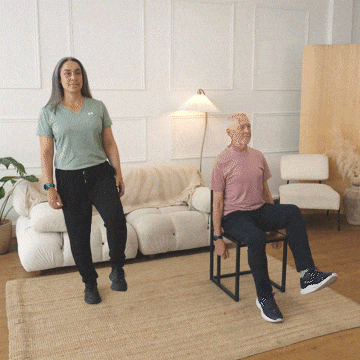
- Sit or stand with your feet hip-width apart.
- Lift 1 leg up and rotate the ankle 8 to 12 times.
- Then rotate your ankle in the other direction.
- Repeat on the other side.
Spinal rotations
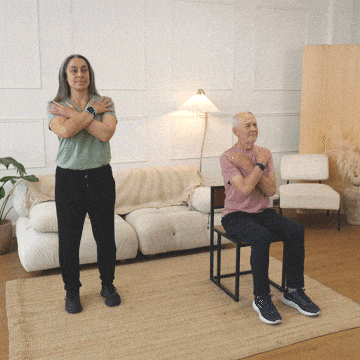
- Sit or stand with your feet hip-width apart and your arms crossed over your chest.
- Inhale and, as you exhale, rotate your upper body to the side while keeping your hips facing forward.
- Then, rotate to the other side.
- Repeat 8 to 12 times.
Side of the body stretch
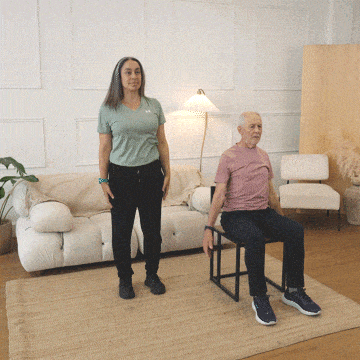
- Sit or stand with your feet hip-width apart.
- Reach 1 arm straight up to the ceiling, while keeping the other arm either by your side or on your hip.
- Inhale, then reach the arm up and over your head in a C shape as you exhale, keeping your hips facing forward in the centre.
- Hold the stretch for 8 to 12 seconds.
- Repeat on the other side.
What to read next...



